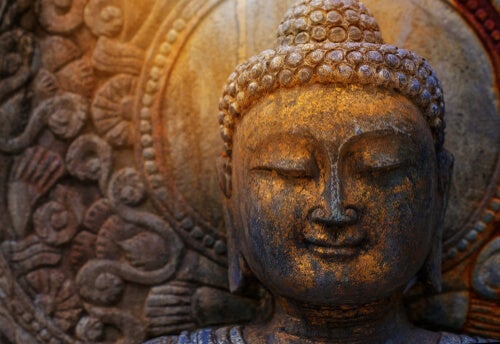The Ten Spiritual Realms of Zen Buddhism

According to Buddhist cosmology, there are ten spiritual realms that become ten different states of mind. These states subject the mind to certain feelings in each one of them. In other words, predetermined aspects dominate in each moment.
Buddhists teach that the ten spiritual realms aren’t all equal. Four of them are considered superior states and six of them are inferior. The superior states come about from voluntary searching, the desire for discovery, and self-improvement.
The four inferior states regard the reaction to the outside world. These are states of mind in which existence is clearly influenced by external forces. They don’t lead to evolution but to suffering. Let’s look at the ten spiritual realms.

1. Learning
“Those who hear the voice” is another name for this. It corresponds to those who observe reality, want to know more about it, and are open to discovering and understanding the truth.
However, this superior state depends on the external. People in this state look for truth through what their senses or others tell them.
2. Fulfillment
This is the second of the ten spiritual realms. “The awakened to the cause” is another name for it.
It corresponds to a greater level of autonomy. Thanks to observation, effort, and meditation, people are able to become conscious of the “why” of things. In other words, they understand the law of cause and effect and how it materializes.
3. Bodhisattva
The word bodhisattva references the state of mind in which practitioners achieve enlightenment, mainly through compassion and altruism.
Those in this state feel a genuine desire to free others from suffering and lead them to enlightenment. In this state, giving and helping are sources of happiness and peace.
4. Buddhahood, one of the ten spiritual realms
Buddhahood, or the state of Buddha, in the highest of the ten spiritual realms. It’s also the highest rank of nobility and what identifies those who have reached true enlightenment.
Buddhahood is a state of absolute inner peace that can’t be altered by any outside circumstance. It’s characterized by wisdom and unlimited compassion.
5. Hell
Hell is the lowest of the ten spiritual realms. It’s a state of mind in which there’s an absolute lack of freedom.
In some cases, it’s about being completely overwhelmed by the suffering that traps you. In others, hate and destructive feelings tie up and asphyxiate those who are in it.
6. Hunger
Unsatisfied wishes dominate the realm of hunger. If there’s desire, it’s because there’s a lack of satisfaction. So whoever desires is doomed to lack.
“Hunger”, in a symbolic sense, makes people feel miserable and makes them adopt insatiable behavior. If you can creatively transform those desires, then there’s a will to be better.
7. Animality
Animality is a state in which people get immediate and irrational satisfaction. Impulse, not reason nor the heart, dominate this state.
Animals fear the powerful and abuse the weak. In this state, life is about fighting to survive instead of a space to create. If animality evolves, it becomes loyalty and generosity.
8. Rage
Also called the realm of upset, its main characteristic if competitiveness. In rage, there’s a tendency to compare yourself to others, always with the intention of being better than them.
Those in this state are arrogant with those weaker and flattering to those more powerful. In this case, people can be conscious, but it’s only for the purpose of achieving selfish goals. If it evolves, it leads to self-esteem.

9. Humanity
People in this state have the capacity for reasoning. Therefore, they can tell right from wrong.
They’re also in control of their behavior. Passion for abstract ideals and vulnerability in the face of negativity characterize this state. From there, they have the potential to advance to a superior state.
10. Ecstasy
“Celestial beings” is another name for people in this state. Pleasure and the joy in satisfying wishes and getting what you want define this state. However, this happiness is temporary.
Happiness and enlightenment are different precisely because one is temporary. It depends on uncontrollable outside circumstances. They don’t have negative emotions, but that’s also temporary.
These ten spiritual realms aren’t set up in any particular order. In other words, you don’t pass from one state to another in a linear manner. It’s possible to advance and go back, though one state predominates for most people.
According to Buddhist cosmology, there are ten spiritual realms that become ten different states of mind. These states subject the mind to certain feelings in each one of them. In other words, predetermined aspects dominate in each moment.
Buddhists teach that the ten spiritual realms aren’t all equal. Four of them are considered superior states and six of them are inferior. The superior states come about from voluntary searching, the desire for discovery, and self-improvement.
The four inferior states regard the reaction to the outside world. These are states of mind in which existence is clearly influenced by external forces. They don’t lead to evolution but to suffering. Let’s look at the ten spiritual realms.

1. Learning
“Those who hear the voice” is another name for this. It corresponds to those who observe reality, want to know more about it, and are open to discovering and understanding the truth.
However, this superior state depends on the external. People in this state look for truth through what their senses or others tell them.
2. Fulfillment
This is the second of the ten spiritual realms. “The awakened to the cause” is another name for it.
It corresponds to a greater level of autonomy. Thanks to observation, effort, and meditation, people are able to become conscious of the “why” of things. In other words, they understand the law of cause and effect and how it materializes.
3. Bodhisattva
The word bodhisattva references the state of mind in which practitioners achieve enlightenment, mainly through compassion and altruism.
Those in this state feel a genuine desire to free others from suffering and lead them to enlightenment. In this state, giving and helping are sources of happiness and peace.
4. Buddhahood, one of the ten spiritual realms
Buddhahood, or the state of Buddha, in the highest of the ten spiritual realms. It’s also the highest rank of nobility and what identifies those who have reached true enlightenment.
Buddhahood is a state of absolute inner peace that can’t be altered by any outside circumstance. It’s characterized by wisdom and unlimited compassion.
5. Hell
Hell is the lowest of the ten spiritual realms. It’s a state of mind in which there’s an absolute lack of freedom.
In some cases, it’s about being completely overwhelmed by the suffering that traps you. In others, hate and destructive feelings tie up and asphyxiate those who are in it.
6. Hunger
Unsatisfied wishes dominate the realm of hunger. If there’s desire, it’s because there’s a lack of satisfaction. So whoever desires is doomed to lack.
“Hunger”, in a symbolic sense, makes people feel miserable and makes them adopt insatiable behavior. If you can creatively transform those desires, then there’s a will to be better.
7. Animality
Animality is a state in which people get immediate and irrational satisfaction. Impulse, not reason nor the heart, dominate this state.
Animals fear the powerful and abuse the weak. In this state, life is about fighting to survive instead of a space to create. If animality evolves, it becomes loyalty and generosity.
8. Rage
Also called the realm of upset, its main characteristic if competitiveness. In rage, there’s a tendency to compare yourself to others, always with the intention of being better than them.
Those in this state are arrogant with those weaker and flattering to those more powerful. In this case, people can be conscious, but it’s only for the purpose of achieving selfish goals. If it evolves, it leads to self-esteem.

9. Humanity
People in this state have the capacity for reasoning. Therefore, they can tell right from wrong.
They’re also in control of their behavior. Passion for abstract ideals and vulnerability in the face of negativity characterize this state. From there, they have the potential to advance to a superior state.
10. Ecstasy
“Celestial beings” is another name for people in this state. Pleasure and the joy in satisfying wishes and getting what you want define this state. However, this happiness is temporary.
Happiness and enlightenment are different precisely because one is temporary. It depends on uncontrollable outside circumstances. They don’t have negative emotions, but that’s also temporary.
These ten spiritual realms aren’t set up in any particular order. In other words, you don’t pass from one state to another in a linear manner. It’s possible to advance and go back, though one state predominates for most people.
All cited sources were thoroughly reviewed by our team to ensure their quality, reliability, currency, and validity. The bibliography of this article was considered reliable and of academic or scientific accuracy.
Hua, H. (2000). Los diez reinos del Dharma no están más allá del pensamiento. Buddhist Text Translation Society.
This text is provided for informational purposes only and does not replace consultation with a professional. If in doubt, consult your specialist.







